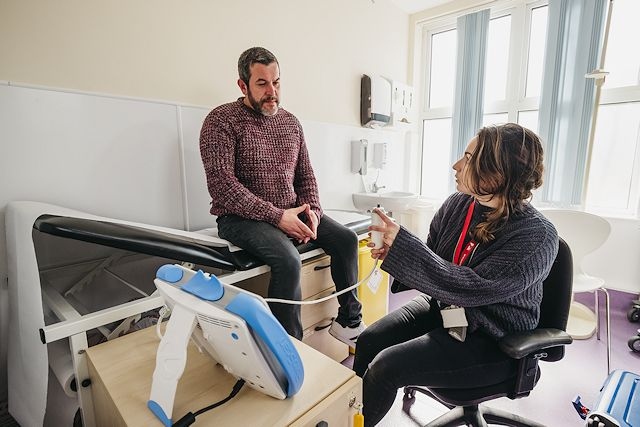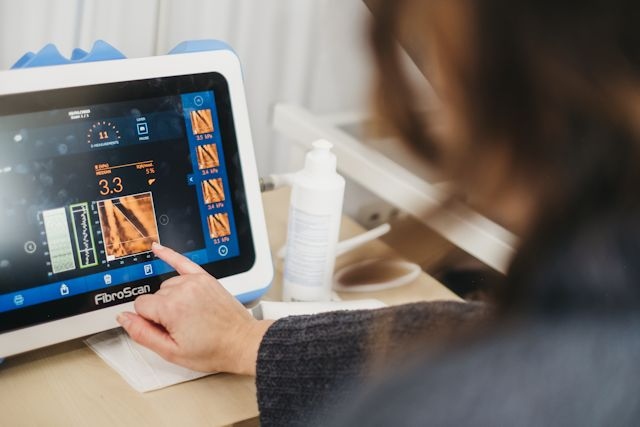GPs should offer liver checks to tackle ‘tsunami’ of harmful drinking, says report
Date published: 29 September 2023

Fibroscans are currently carried out at Turning Point’s Rochdale and Oldham Drug and Alcohol Service (ROAR) service
Free liver checks should be routinely available – including at GP practices – to identify people drinking at dangerous levels, says a report published by Turning Point on 21 September.
The new analysis by the health and care organisation lays bare the impact of the ‘tsunami’ linked to alcohol-related harm with a £1.16 billion cost alone to the NHS from UK hospital admissions between 2021 and 2022.
Official figures show 9,641 people died in 2021 from causes specifically related to alcohol, the highest number on record and 7.4% higher than in 2020. Deaths from liver disease alone have increased by 400% since the 1970s and account for most alcohol-related deaths.
A key recommendation made in the report, 'A Sobering Thought', is for public health teams to ensure fibroscan tests – quick and painless health checks that can detect liver disease before any physical symptoms develop – are more widely available.
Turning Point says its services – which support over 1,800 people a year in Rochdale and Oldham for alcohol-related problems – are seeing increasing numbers of referrals for those who have end-stage liver disease.
In 2021/22, alcohol related hospital admission rates (when standardised per 100,000 people) were considerably higher in Rochdale (1,991) and in Oldham (1,829) compared with England’s national average (1,734).
Fibroscans are currently carried out at Turning Point’s Rochdale and Oldham Drug and Alcohol Service (ROAR) service.
Between April 2022-April 2023, the ROAR service supported 1,869 with alcohol issues. A number of these clients were offered fibroscans to check for liver disease and were referred for further treatment when needed.
The report recommends that fibroscans should be more widely available as part of an urgent need to make alcohol harm a government priority to avoid further damage to people’s health, the NHS, criminal justice system and to the economy.
The report added that fibroscans should be among measures to improve prevention and identify people early on who are at risk of liver damage from drinking too much.
Other recommendations include a national alcohol strategy. This should include dedicated expertise within the wider health service such as in mental health and primary care, not just within community drug and alcohol treatment services.
A government health campaign is also needed that targets hazardous drinkers including an online course that helps you understand your own drinking and the impact it having and motivates you reduce your drinking or stop altogether, can be accessed digitally to raise awareness of the negative impact of alcohol.
Alcohol-related liver disease is a largely hidden epidemic because the warning signs such as yellowing skin take years to develop. Many people are unaware alcohol is affecting their health until they develop advanced cirrhosis.
Wider availability of liver testing - a fibroscan machine costs around £20,000 a year to lease - would enable treatment services to reach people before they become seriously unwell, and reduce the burden on the NHS.
Small and portable, the fibroscan machine takes 5 minutes perform a non-invasive ultrasound. Nurses and other healthcare staff can use the device to measure inflammation of the liver.

Afsah (not her real name), 42, has been supported by the team at ROAR and has had a fibroscan done. She said:
“I was in an abusive relationship with my ex-partner which led me to start drinking in 2007. I wanted to numb the physical and mental pain I was going through and block everything out. It was my way of escaping everything.
“I come from a British-Pakistani Muslim family where drinking isn’t permissible and there is a lot of stigma against people who drink, especially women from that community.
“The drinking has had a big impact on my health. I have liver disease. I’ve had to have blood transfusions from throwing up blood as a result of the heavy drinking.
“I had previously had fibroscan in hospital which showed I had liver disease. I had another one at Turning Point a few weeks ago and it showed my liver disease had worsened. I also had to have an endoscopy to stitch parts of my stomach back together due to the damage caused by the alcohol.
“The fibroscan made me realise that I am on a dangerous path but there was hope that if I cut down/stopped drinking, I could undo some of the damage that drinking had caused to my liver.
“I am determined to do the detox and rehab programme with Turning Point because I don’t want to go back to the dark hole that I was previously been in.”
Annie Lynn, senior operations manager at Turning Point’s Rochdale and Oldham Drug and Alcohol Service (ROAR), said: “A fibroscan enables people to make healthier, informed choices. If I'm not aware of the effects of alcohol on my body, having a fibroscan and having that information means that I can make a decision about whether I want to continue drinking and not really thinking about the consequences.
“It's an invaluable tool for us, most definitely. It's identifying some of those potential health problems which would otherwise be invisible.
“The fibroscan machine is portable which means we can go out and work more in the community to support some of those people who have unmet needs and are not in treatment with us.
“We ask anyone struggling with their own alcohol usage or that of a loved one to please contact our services.”
Karen Penswick, clinical services manager at Rochdale and Oldham Drug and Alcohol Service (ROAR), said: “Liver disease is often symptom free in the early stages, and people do not realise the hidden impact their drinking can be having on their health.
“Being able to show clients that impact through the use of fibroscan within the supportive and non-judgemental environment of our service, we are able to support clients to make changes to their alcohol use which will have positive outcomes for their liver and overall health.
“We have seen the impact fibroscan results can have in helping clients make positive behaviour changes, deciding to pursue an alcohol detox when their initial plan was to reduce their drinking slightly, for example.
“Even where the result has shown no current damage, the discussion around why we scan the liver and what we are looking for when we do has been a powerful tool with clients to increase their knowledge and understanding of the impact alcohol can have our health.
Do you have a story for us?
Let us know by emailing news@rochdaleonline.co.uk
All contact will be treated in confidence.
Most Viewed News Stories
- 1Detective from Rochdale convicted of sexually assaulting colleagues
- 2Changes to council services over Christmas and New Year
- 3Andy Burnham "did not ask" for powers to overturn council decisions
- 4Rail travel advice calendar released for week over Christmas
- 5Taco Bell celebrates Rochdale grand opening
To contact the Rochdale Online news desk, email news@rochdaleonline.co.uk or visit our news submission page.
To get the latest news on your desktop or mobile, follow Rochdale Online on Twitter and Facebook.


